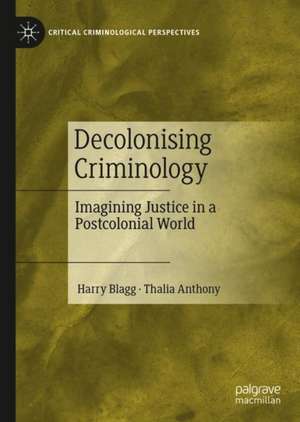Decolonising Criminology: Imagining Justice in a Postcolonial World: Critical Criminological Perspectives
Autor Harry Blagg, Thalia Anthonyen Limba Engleză Hardback – 9 dec 2019
Din seria Critical Criminological Perspectives
-
 Preț: 324.62 lei
Preț: 324.62 lei - 20%
 Preț: 752.03 lei
Preț: 752.03 lei - 15%
 Preț: 640.06 lei
Preț: 640.06 lei - 18%
 Preț: 730.35 lei
Preț: 730.35 lei - 18%
 Preț: 1003.24 lei
Preț: 1003.24 lei -
 Preț: 391.61 lei
Preț: 391.61 lei -
 Preț: 388.72 lei
Preț: 388.72 lei - 15%
 Preț: 529.92 lei
Preț: 529.92 lei - 15%
 Preț: 641.85 lei
Preț: 641.85 lei - 15%
 Preț: 638.43 lei
Preț: 638.43 lei - 15%
 Preț: 690.44 lei
Preț: 690.44 lei -
 Preț: 398.74 lei
Preț: 398.74 lei - 15%
 Preț: 636.30 lei
Preț: 636.30 lei -
 Preț: 392.37 lei
Preț: 392.37 lei - 18%
 Preț: 725.75 lei
Preț: 725.75 lei -
 Preț: 384.70 lei
Preț: 384.70 lei - 18%
 Preț: 782.72 lei
Preț: 782.72 lei - 15%
 Preț: 642.51 lei
Preț: 642.51 lei - 15%
 Preț: 527.32 lei
Preț: 527.32 lei -
 Preț: 446.26 lei
Preț: 446.26 lei - 18%
 Preț: 781.94 lei
Preț: 781.94 lei - 15%
 Preț: 469.22 lei
Preț: 469.22 lei - 15%
 Preț: 693.39 lei
Preț: 693.39 lei - 18%
 Preț: 1001.65 lei
Preț: 1001.65 lei - 18%
 Preț: 726.23 lei
Preț: 726.23 lei -
 Preț: 417.30 lei
Preț: 417.30 lei - 18%
 Preț: 781.62 lei
Preț: 781.62 lei - 15%
 Preț: 703.85 lei
Preț: 703.85 lei -
 Preț: 212.06 lei
Preț: 212.06 lei -
 Preț: 394.51 lei
Preț: 394.51 lei - 15%
 Preț: 640.06 lei
Preț: 640.06 lei - 15%
 Preț: 640.88 lei
Preț: 640.88 lei -
 Preț: 416.71 lei
Preț: 416.71 lei - 18%
 Preț: 1111.22 lei
Preț: 1111.22 lei
Preț: 1007.03 lei
Preț vechi: 1228.09 lei
-18% Nou
Puncte Express: 1511
Preț estimativ în valută:
192.72€ • 200.46$ • 159.10£
192.72€ • 200.46$ • 159.10£
Carte tipărită la comandă
Livrare economică 14-28 aprilie
Preluare comenzi: 021 569.72.76
Specificații
ISBN-13: 9781137532466
ISBN-10: 1137532467
Pagini: 399
Ilustrații: XIX, 399 p. 2 illus.
Dimensiuni: 148 x 210 x 31 mm
Greutate: 0.65 kg
Ediția:1st ed. 2019
Editura: Palgrave Macmillan UK
Colecția Palgrave Macmillan
Seria Critical Criminological Perspectives
Locul publicării:London, United Kingdom
ISBN-10: 1137532467
Pagini: 399
Ilustrații: XIX, 399 p. 2 illus.
Dimensiuni: 148 x 210 x 31 mm
Greutate: 0.65 kg
Ediția:1st ed. 2019
Editura: Palgrave Macmillan UK
Colecția Palgrave Macmillan
Seria Critical Criminological Perspectives
Locul publicării:London, United Kingdom
Cuprins
1. Introduction: Turning Criminology Upside Down.- 2. Postcolonial Criminology: ‘The Past Isn’t Over...’.- 3. ‘Who Speaks for Place?’.- 4. Decolonising Criminology Methodologies.- 5. Borders Are Strange Places: From Borders of the State to Boundaries of the Prison.- 6. Restorative Justice or Indigenous Justice?.- 7. Disciplinary Power or Colonial Power?.-8. Justice in the Shadow of the Camp.- 9. Carceral Feminism: Saving Indigenous women from Indigenous men.- 10. Hybrid Justice i: Indigenous Sentencing and Justice Planning.- 11. Hybrid Justice ii: Night Patrols and Place Based Sovereignty.- 12. Conclusions: State of Exception and Bare Life in Criminology and Criminal “Justice”.
Notă biografică
Harry Blagg is Professor of Criminology and Director of the Centre for Indigenous Peoples and Criminal Justice at The University of Western Australia. He has over twenty years of experience conducting research with Aboriginal people across Australia on justice related issues. He has developed a specific focus on remote communities – particularly in the Kimberly Region of WA and the Northern Territory – and has been involved in research, consultancy and policy development around community justice, night patrols, men and women’s safe places, youth justice and family violence.
Thalia Anthony is Associate Professor at the University of Technology Sydney, Australia. Her expertise is in the areas of criminal law and procedure, and Indigenous people and the law, with a particular specialisation in discrimination in the criminal justice system, Indigenous community justice mechanisms and the lived experience of Indigenous women in prisons. She has developednew understandings of the role of criminalisation in governing Indigenous communities. Her research is informed by fieldwork in Indigenous communities and partnerships with Indigenous organisations in Australia and overseas.
Textul de pe ultima copertă
This book undertakes an exploratory exercise in decolonizing criminology through engaging postcolonial and postdisciplinary perspectives and methodologies. Through its historical and political analysis and place-based case studies, it challenges criminological inquiry by installing colonial structures of power at the centre of the contemporary criminological debate. This work unseats the Western nation-state as the singular point of departure for comparative criminological and socio-legal research. Decolonising Criminology argues that postcolonial and postdisciplinary critique can open up new pathways for criminological investigation. It builds on recent debates in criminology from outside of the Anglosphere. The authors deploy a number of heuristic devices, perspectives and theories generally ignored by criminologists of the Global North and engage perspectives concerned with articulating new decolonised epistemologies of the Global South. This book disputes the view that colonisation is a thing of the past and provides lessons for the Global North.
Caracteristici
Appeals to students and scholars of criminology and socio-legal studies with an interest in colonial and postcolonial societies Provides writing from two experienced scholars with global appeal Fills a significant gap in contemporary criminology and related literature.
